An Interview with Claire Oleson, author of THINGS FROM THE CREEK BED WE COULD HAVE BEEN (Newfound Press, 64 pages), by Andrea Caswell
Claire Oleson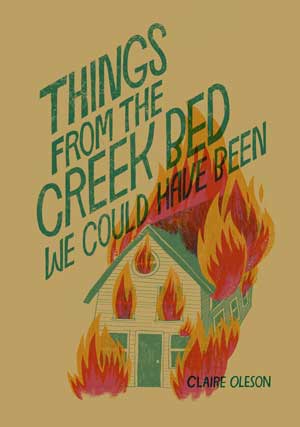 ’s chapbook, Things From the Creek Bed We Could Have Been, is the winner of the Newfound 2019 Prose Prize, awarded annually to a chapbook-length work of exceptional fiction or nonfiction that explores how place shapes identity, imagination, and understanding.
’s chapbook, Things From the Creek Bed We Could Have Been, is the winner of the Newfound 2019 Prose Prize, awarded annually to a chapbook-length work of exceptional fiction or nonfiction that explores how place shapes identity, imagination, and understanding.
In the following interview, she discusses the work, and how making art can reshape our understanding of what we see in the world.
Andrea Caswell: The stories in this collection are language-driven, intensely intimate, and saturated with beautiful images. Did any of these stories begin as poems or prose poems?
Claire Oleson: I enjoy navigating in the spaces between prose and poetry; in Creek Bed, I hope a poetic dedication to the individual word is visible alongside the breathing space that prose gives to its subjects. I wanted the size, the “living room” of a story, with the minutia and pace that poetry can offer. Also, somewhat in retrospect, I’ve found my writing across genres is often propelled by sight more than distinct action. I wanted image to offer propulsion, like plot can, but I wanted everything I included to belong to sensation, to be incapable of happening anywhere outside of a body.
AC: The artist Corita Kent said, “Art does not come from thinking, but from responding.” To what are you responding with Things From the Creek Bed We Could Have Been?
CO: Alongside this desire for the writing to feel embodied, I also want the readers who come to it to feel like they belong inside its feeling. Here, I don’t mean that they “belong” in the sense that there’s a neat space carved out for an audience-surrogate, but far more that the story isn’t complete until someone is in it, feeling it. Following the quote you provided, I think it’s fair to say that if I wanted to be easy, to be point-blank, and solely focused on convincing, I would have written an extended essay on image, gender, bodies, and ownership. This would have been neater than what I’ve chosen to do: a slew of surreal-adjacent and often absurd stories that take longer to tell you what a thesis could blurt. But I come to you with no footnotes and more mess because I agree with Corita Kent here; this isn’t art until it’s being responded to, occupied, waded in. In that same vein, certainly everything I’ve written can be taken as a form of response. I’d love to say I’ve involved some thought too, but absolutely, the best feelings and needs and evenings I’ve communicated in Creek Bed come from having carried feelings and needs and evenings.
I want these stories to be spaces people come to live in, if only briefly, and to encounter as potential lives or ways of living. —Claire Oleson
AC: Tell us about the title.
CO: I thought about pulling a title from one of the interior stories, but this felt like a missed opportunity to sneak more writing in, and I didn’t feel it would envelope everything included with a flexible but precise name. Things From the Creek Bed We Could Have Been is a stupid title because it’s long, it takes time to write out, type out, google, or tell someone. I sort of love it for being a little bit stupid, but in all earnestness, I made it and picked it because I feel it presents a sense of possibility, calmness, fear, and absurdity in one (labored) breath. I want these stories to be spaces people come to live in, if only briefly, and to encounter as potential lives or ways of living. There’s a lot of water in these pieces and the first piece opens inside a creek, so I feel invoking an immediate sense of setting from the cover that flows right into the first story offers an organic and (forgive me) fluid entrance. Oh also, god, I will confess that I was thinking of the poet C.D. Wright who has a book legitimately titled The Poet, The Lion, Talking Pictures, El Farolito, A Wedding in St. Roch, The Big Box Store, The Warp in the Mirror, Spring, Midnights, Fire & All. To me, this is superb. It gushes and it leaves things behind with you. A title like this feels like someone is standing in front of you, continuing to hand you delicate things you can’t possibly carry but also can’t afford to drop. You just have to be overwhelmed. I thought of doing something more stupid and longer than Things From the Creek Bed We Could Have Been, but in the end, I thought C.D. Wright has already done this so well, I might as well be humane to my publisher and cover artist.
AC: Visual arts, such as photography and painting, are integral to many of these stories. How would you describe the role of other art forms in your creative life?
CO: There is a lot of visual art and I put it in to continue to ask people to see as they’re reading. I love knowing that every piece hung/illuminated/shoved/presented in these stories is going to be completely different, reader to reader, despite their semi-static existence in the inked word. Everyone leaves with their own different gallery and there’s no one right, Platonic canvas or neon light. The seeing done by reading makes them, again and again, and it recruits the reader in their making. Because many of my characters are teetering on deciding whether or not what they’re making is “good” or “beautiful” or “ignorant, insufficient, unworthy,” some of that decision gets to come from how the reader decides to hang, frame, and know them. In my life outside of writing, I like to keep up drawing and a pinprick of painting when supplies are handy. I think I know just enough of each to know that I’m a hobbyist (but, with adoration). Having worked at both has taught me the delightful truth that, all day, we are seeing wrong. It’s not until you sit to commit something in front of you to paper or canvas or cardboard that you process what you think a face looks like is entirely wrong, in a series of minute but critical ways. It’s really wonderful to be so incorrect about what we take to be the basics. Seeing, a lot like reading, is often taken as a passive task, something that just inhales. Making art and looking at art is quick and elated to show you that seeing is something you do and can learn to do better but not perfectly. Reading, too, is a work. Reading is deciding to believe in small and nonexistent rooms and move things around in them for a while. Please, if you’re reading this, come into the Creek Bed and mess up the furniture.
AC: Each story in the collection is narrated in the first person. What were some of the narrative decisions you made as you wrote these?
CO: I wanted everyone written to feel like they were speaking for themselves. I wanted every protagonist to have both the freedom and constraint of being steeped in their own thoughts alone. With some free indirect discourse, the reader gets gleams of other characters’ priorities, but the bulk of narration is dedicated to one person at a time. This is, I think, the hardest number of people to be at a time. Amidst the teetering moments of emergency or non-emergency that my stories center on, the feeling of being in one brain can manage to be both the most comforting and most alarming thing. First-person is an allowance to be candid alongside the pressure to be impressive, coherent, and interesting, for both the characters and writer; so I hope my teetering, one-at-a-time people are just that. And if they’re average and incoherent, hopefully they’re at least devastatingly fascinating to make up for it.
AC: Tell us about Newfound. What inspired you to enter their chapbook competition? What have you enjoyed most about working with them?
CO: I’d seen Newfound’s chapbooks prior to submitting and I think the physical books they produce are made with such detail, care, and clear desire to thoughtfully make a fitting physical body for a work of writing. Coming to the end of my undergraduate career, I had begun to amass pieces from workshops that I still liked even after bringing them through everyone’s teeth. I wanted to do something with them that would let them belong to and with one another. I think these contests offer a wonderful gateway into publishing for authors who are looking into the world of books after having appeared in journals. Chapbooks are also so digestible and offer a lot for the short prose or poetry writer while still providing the distinct and individual object that’s dedicated to one author. Working with Newfound has been lovely; they’re responsive, kind, invested, and showed enthusiasm for my work from the time of my initial submission to the binding and distributing of the books.
AC: What are you working on now?
CO: Ooh, surviving. Some writing is happening. I’m mostly invested in finding productive and lucrative-enough work in the current climate. But I’ve made some poems I’m not unfond of, some lavender simple syrup I’m very fond of, and I’m preparing to prepare to cultivate the desire to make a full-length manuscript.
To purchase a copy of Things From the Creek Bed We Could Have Been, click here.
◊◊
Claire Oleson is a queer writer hailing from Grand Rapids, Michigan. She has a B.A. in English and Creative Writing from Kenyon College, where she won the Propper Prize for poetry and the Denham Sutcliffe Memorial Award. Claire Oleson’s writing has been published by Limestone, Newfound, Bridge Eight Magazine, Sugar House Review, and the Kenyon Review online. She is the senior poetry editor for Cleaver. Visit Claire Oleson’s bio page here.
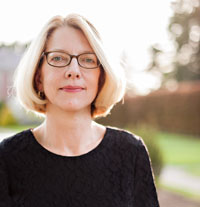 Andrea Caswell holds an MFA from the Bennington Writing Seminars and is a fiction editor at Cleaver Magazine. Her work has been published by River Teeth, The Normal School, Fifth Wednesday, Columbia Journal, and others. In 2019 she was selected as a fiction participant for the Sewanee Writers’ Conference. A native of Los Angeles, Andrea now teaches writing in Newburyport, Massachusetts.
Andrea Caswell holds an MFA from the Bennington Writing Seminars and is a fiction editor at Cleaver Magazine. Her work has been published by River Teeth, The Normal School, Fifth Wednesday, Columbia Journal, and others. In 2019 she was selected as a fiction participant for the Sewanee Writers’ Conference. A native of Los Angeles, Andrea now teaches writing in Newburyport, Massachusetts.

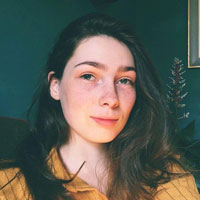
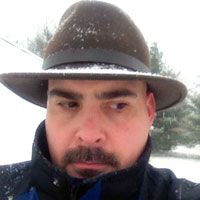

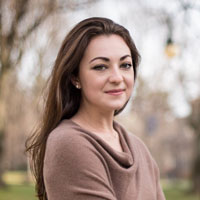 Social Media Maven Natalie Kawam is an undergraduate poet at Bryn Mawr College. In May, 2016, she received the Academy of American Poets Prize at Bryn Mawr, and was published in September 2016 through the Academy. See her poetry
Social Media Maven Natalie Kawam is an undergraduate poet at Bryn Mawr College. In May, 2016, she received the Academy of American Poets Prize at Bryn Mawr, and was published in September 2016 through the Academy. See her poetry